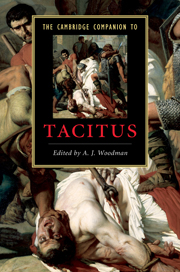Book contents
- Frontmatter
- Introduction
- Part I Contexts
- Part II Texts
- Part III Topics
- Part IV Transmission
- 16 From manuscript to print
- 17 Tacitus and political thought in early modern Europe, c. 1530-c. 1640
- 18 Gibbon and Tacitus
- 19 A dangerous book: the reception of the Germania
- 20 Tacitus and the twentieth-century novel
- 21 Tacitus’ Syme
- Chronological table
- Abbreviations and bibliography
- Index
17 - Tacitus and political thought in early modern Europe, c. 1530-c. 1640
from Part IV - Transmission
Published online by Cambridge University Press: 28 March 2010
- Frontmatter
- Introduction
- Part I Contexts
- Part II Texts
- Part III Topics
- Part IV Transmission
- 16 From manuscript to print
- 17 Tacitus and political thought in early modern Europe, c. 1530-c. 1640
- 18 Gibbon and Tacitus
- 19 A dangerous book: the reception of the Germania
- 20 Tacitus and the twentieth-century novel
- 21 Tacitus’ Syme
- Chronological table
- Abbreviations and bibliography
- Index
Summary
Readers of Roman history in early modern Europe showered praise on the timeless universality of Tacitus' wisdom: 'In iudgement there is none sounder, for instruction of life, for al times', wrote the author of the English translation of the Annals and Germania. But students of Tacitus in the sixteenth and seventeenth centuries also believed that his writings communed directly with their own present; that Tacitus revealed political truths to all ages, but most especially 'to these our times'. Tacitus had been largely forgotten or overlooked in the medieval and early Renaissance periods, and, despite the print publication of his works in various editions from the 1470s, his relative obscurity persisted in the sixteenth century. The magisterial editions of Justus Lipsius (1547-1606) from 1574 to 1607, however, anticipated a change in scholarly and political culture in the later sixteenth century, when Tacitus enjoyed an overwhelming and unprecedented popularity. Between 1600 and 1649 at least sixty-seven editions of the Annals and Histories were printed. The major works were translated into various vernacular languages, widening the readership of an author whose prose was deemed difficult even in a Latinate culture. Writers modelled the style, content and structure of their own histories on Tacitus, whilst the Annals in particular supplied dramatists with the most lurid of plots to realise on the stage.
- Type
- Chapter
- Information
- The Cambridge Companion to Tacitus , pp. 253 - 268Publisher: Cambridge University PressPrint publication year: 2010
- 9
- Cited by

